Reflective Journal: Gibbs Model Analysis of Skills and Competencies
VerifiedAdded on 2023/01/13
|7
|2019
|85
Journal and Reflective Writing
AI Summary
This reflective journal uses Gibbs' Reflective Model to analyze a student's experiences and skill development within a module focused on employability and study skills. The journal describes the module's activities, including communication, research, teamwork, and ICT use. The student reflects on feelings of nervousness at the beginning, evolving to confidence and optimism. The evaluation section highlights positive aspects like effective research and teamwork, while also identifying weaknesses in written communication, ICT skills, and time management. The analysis section emphasizes the importance of employability skills and the need for improvement in specific areas. The student concludes that these skills are essential for academic and professional success and outlines an action plan involving workshops, time-based activities, and seminars to enhance skills in written communication, time management, and problem-solving. The journal provides a comprehensive overview of the student's self-assessment and plans for future growth within the professional development module.
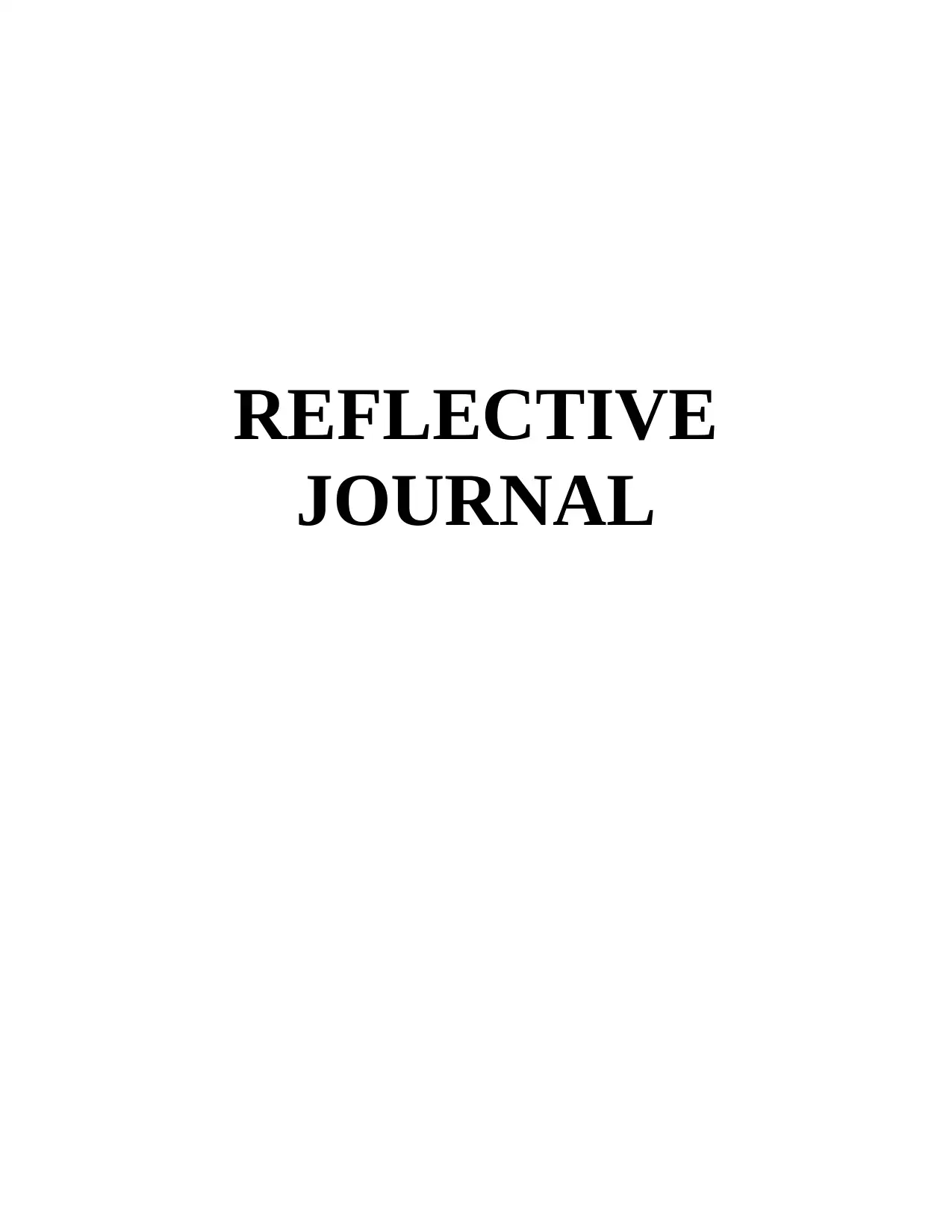
REFLECTIVE
JOURNAL
JOURNAL
Paraphrase This Document
Need a fresh take? Get an instant paraphrase of this document with our AI Paraphraser
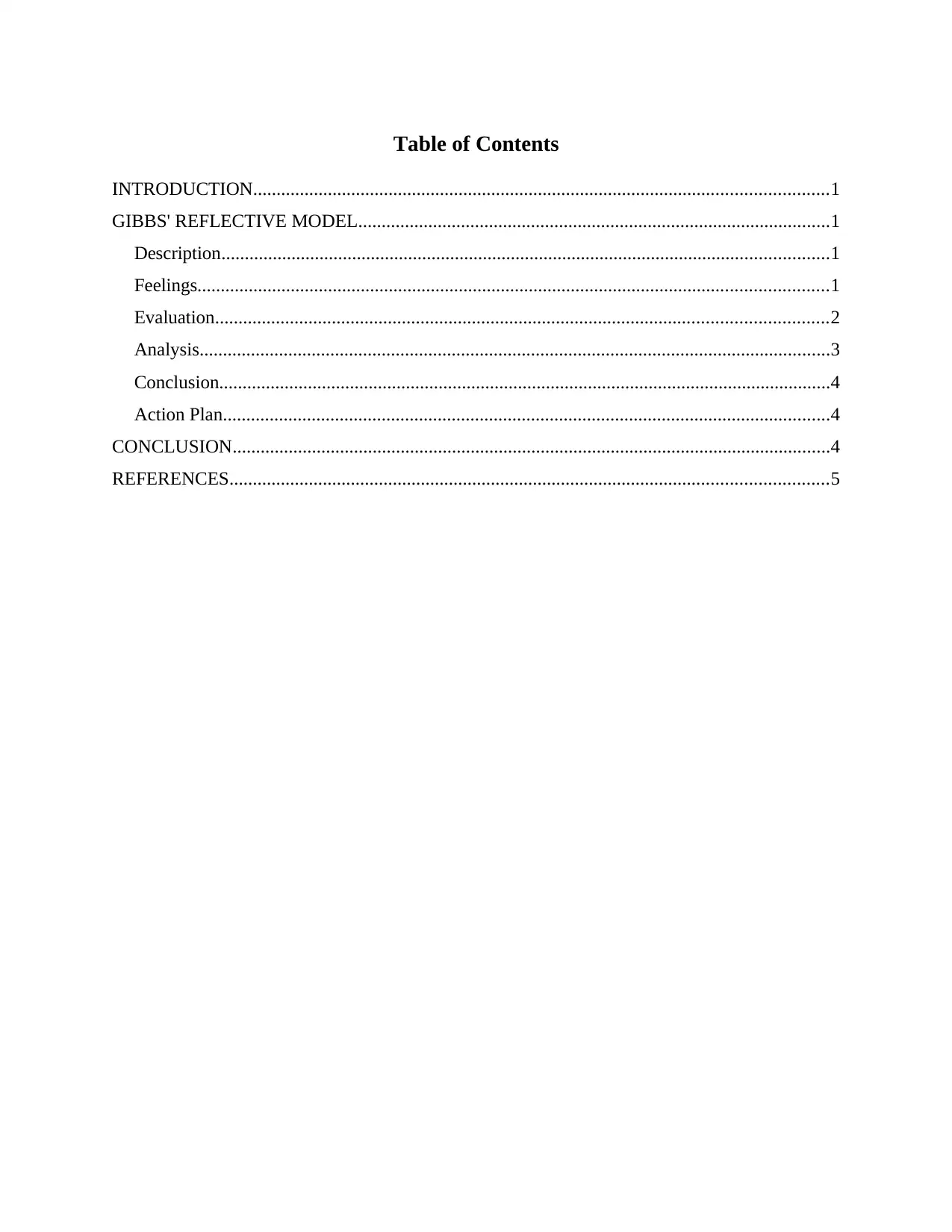
Table of Contents
INTRODUCTION...........................................................................................................................1
GIBBS' REFLECTIVE MODEL.....................................................................................................1
Description..................................................................................................................................1
Feelings.......................................................................................................................................1
Evaluation...................................................................................................................................2
Analysis.......................................................................................................................................3
Conclusion...................................................................................................................................4
Action Plan..................................................................................................................................4
CONCLUSION................................................................................................................................4
REFERENCES................................................................................................................................5
INTRODUCTION...........................................................................................................................1
GIBBS' REFLECTIVE MODEL.....................................................................................................1
Description..................................................................................................................................1
Feelings.......................................................................................................................................1
Evaluation...................................................................................................................................2
Analysis.......................................................................................................................................3
Conclusion...................................................................................................................................4
Action Plan..................................................................................................................................4
CONCLUSION................................................................................................................................4
REFERENCES................................................................................................................................5
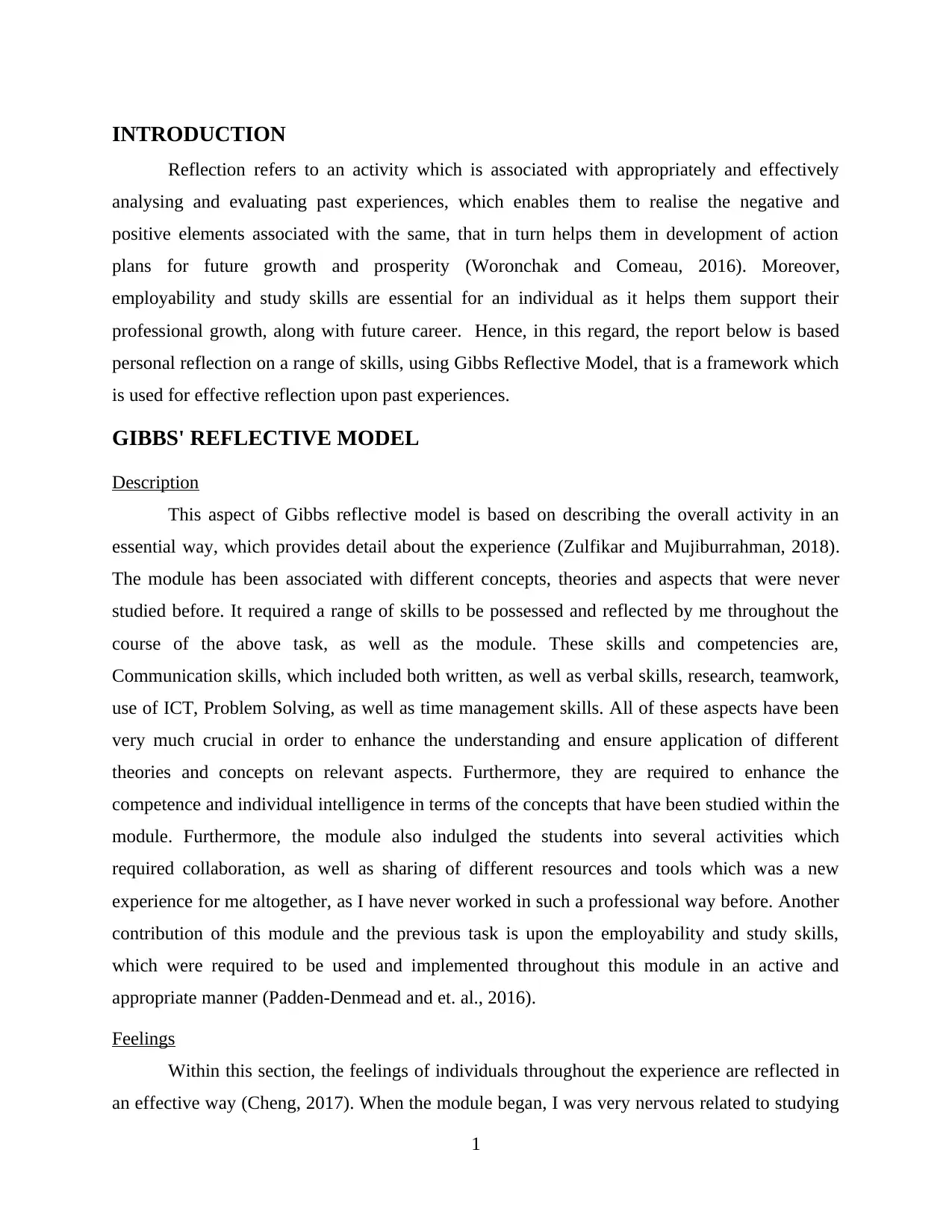
INTRODUCTION
Reflection refers to an activity which is associated with appropriately and effectively
analysing and evaluating past experiences, which enables them to realise the negative and
positive elements associated with the same, that in turn helps them in development of action
plans for future growth and prosperity (Woronchak and Comeau, 2016). Moreover,
employability and study skills are essential for an individual as it helps them support their
professional growth, along with future career. Hence, in this regard, the report below is based
personal reflection on a range of skills, using Gibbs Reflective Model, that is a framework which
is used for effective reflection upon past experiences.
GIBBS' REFLECTIVE MODEL
Description
This aspect of Gibbs reflective model is based on describing the overall activity in an
essential way, which provides detail about the experience (Zulfikar and Mujiburrahman, 2018).
The module has been associated with different concepts, theories and aspects that were never
studied before. It required a range of skills to be possessed and reflected by me throughout the
course of the above task, as well as the module. These skills and competencies are,
Communication skills, which included both written, as well as verbal skills, research, teamwork,
use of ICT, Problem Solving, as well as time management skills. All of these aspects have been
very much crucial in order to enhance the understanding and ensure application of different
theories and concepts on relevant aspects. Furthermore, they are required to enhance the
competence and individual intelligence in terms of the concepts that have been studied within the
module. Furthermore, the module also indulged the students into several activities which
required collaboration, as well as sharing of different resources and tools which was a new
experience for me altogether, as I have never worked in such a professional way before. Another
contribution of this module and the previous task is upon the employability and study skills,
which were required to be used and implemented throughout this module in an active and
appropriate manner (Padden-Denmead and et. al., 2016).
Feelings
Within this section, the feelings of individuals throughout the experience are reflected in
an effective way (Cheng, 2017). When the module began, I was very nervous related to studying
1
Reflection refers to an activity which is associated with appropriately and effectively
analysing and evaluating past experiences, which enables them to realise the negative and
positive elements associated with the same, that in turn helps them in development of action
plans for future growth and prosperity (Woronchak and Comeau, 2016). Moreover,
employability and study skills are essential for an individual as it helps them support their
professional growth, along with future career. Hence, in this regard, the report below is based
personal reflection on a range of skills, using Gibbs Reflective Model, that is a framework which
is used for effective reflection upon past experiences.
GIBBS' REFLECTIVE MODEL
Description
This aspect of Gibbs reflective model is based on describing the overall activity in an
essential way, which provides detail about the experience (Zulfikar and Mujiburrahman, 2018).
The module has been associated with different concepts, theories and aspects that were never
studied before. It required a range of skills to be possessed and reflected by me throughout the
course of the above task, as well as the module. These skills and competencies are,
Communication skills, which included both written, as well as verbal skills, research, teamwork,
use of ICT, Problem Solving, as well as time management skills. All of these aspects have been
very much crucial in order to enhance the understanding and ensure application of different
theories and concepts on relevant aspects. Furthermore, they are required to enhance the
competence and individual intelligence in terms of the concepts that have been studied within the
module. Furthermore, the module also indulged the students into several activities which
required collaboration, as well as sharing of different resources and tools which was a new
experience for me altogether, as I have never worked in such a professional way before. Another
contribution of this module and the previous task is upon the employability and study skills,
which were required to be used and implemented throughout this module in an active and
appropriate manner (Padden-Denmead and et. al., 2016).
Feelings
Within this section, the feelings of individuals throughout the experience are reflected in
an effective way (Cheng, 2017). When the module began, I was very nervous related to studying
1
⊘ This is a preview!⊘
Do you want full access?
Subscribe today to unlock all pages.

Trusted by 1+ million students worldwide
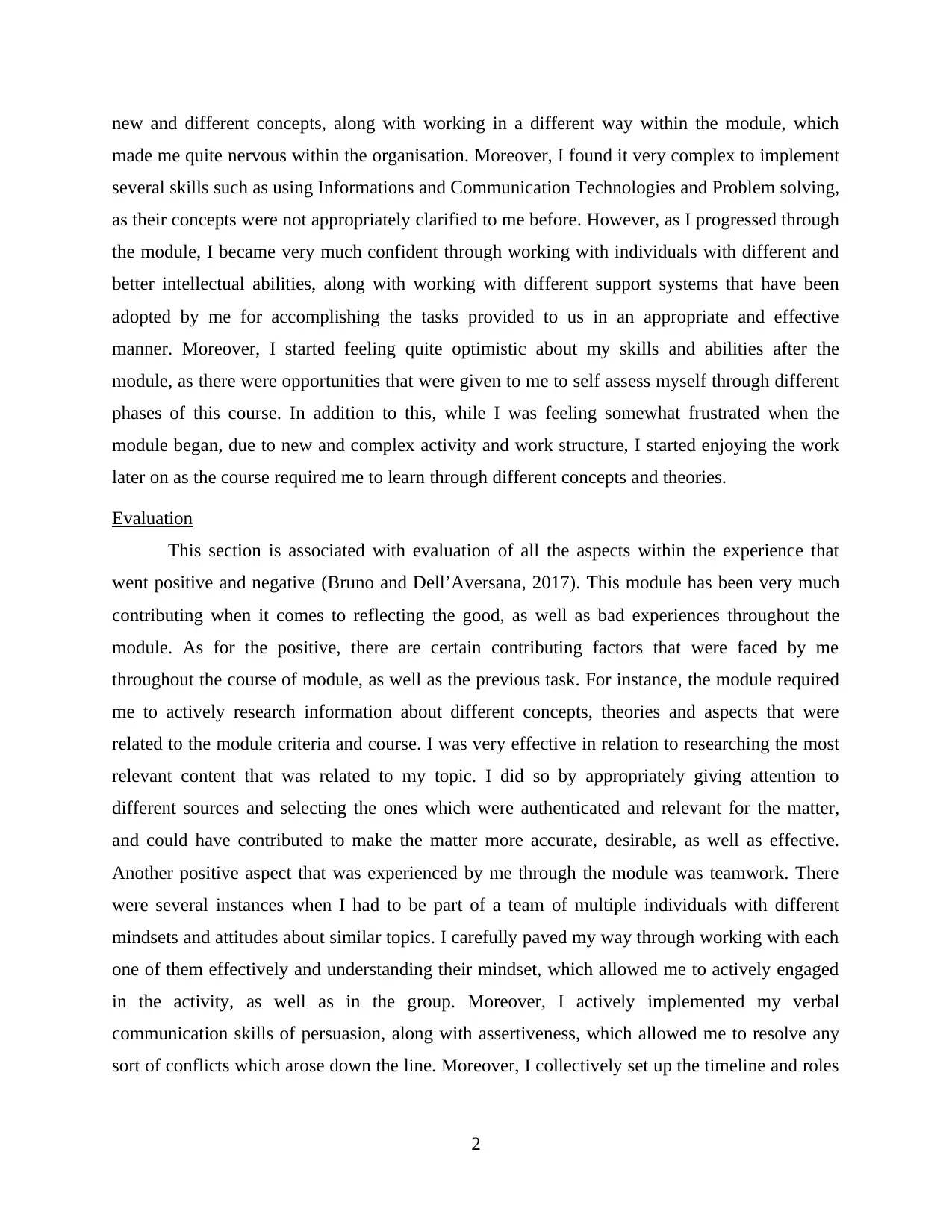
new and different concepts, along with working in a different way within the module, which
made me quite nervous within the organisation. Moreover, I found it very complex to implement
several skills such as using Informations and Communication Technologies and Problem solving,
as their concepts were not appropriately clarified to me before. However, as I progressed through
the module, I became very much confident through working with individuals with different and
better intellectual abilities, along with working with different support systems that have been
adopted by me for accomplishing the tasks provided to us in an appropriate and effective
manner. Moreover, I started feeling quite optimistic about my skills and abilities after the
module, as there were opportunities that were given to me to self assess myself through different
phases of this course. In addition to this, while I was feeling somewhat frustrated when the
module began, due to new and complex activity and work structure, I started enjoying the work
later on as the course required me to learn through different concepts and theories.
Evaluation
This section is associated with evaluation of all the aspects within the experience that
went positive and negative (Bruno and Dell’Aversana, 2017). This module has been very much
contributing when it comes to reflecting the good, as well as bad experiences throughout the
module. As for the positive, there are certain contributing factors that were faced by me
throughout the course of module, as well as the previous task. For instance, the module required
me to actively research information about different concepts, theories and aspects that were
related to the module criteria and course. I was very effective in relation to researching the most
relevant content that was related to my topic. I did so by appropriately giving attention to
different sources and selecting the ones which were authenticated and relevant for the matter,
and could have contributed to make the matter more accurate, desirable, as well as effective.
Another positive aspect that was experienced by me through the module was teamwork. There
were several instances when I had to be part of a team of multiple individuals with different
mindsets and attitudes about similar topics. I carefully paved my way through working with each
one of them effectively and understanding their mindset, which allowed me to actively engaged
in the activity, as well as in the group. Moreover, I actively implemented my verbal
communication skills of persuasion, along with assertiveness, which allowed me to resolve any
sort of conflicts which arose down the line. Moreover, I collectively set up the timeline and roles
2
made me quite nervous within the organisation. Moreover, I found it very complex to implement
several skills such as using Informations and Communication Technologies and Problem solving,
as their concepts were not appropriately clarified to me before. However, as I progressed through
the module, I became very much confident through working with individuals with different and
better intellectual abilities, along with working with different support systems that have been
adopted by me for accomplishing the tasks provided to us in an appropriate and effective
manner. Moreover, I started feeling quite optimistic about my skills and abilities after the
module, as there were opportunities that were given to me to self assess myself through different
phases of this course. In addition to this, while I was feeling somewhat frustrated when the
module began, due to new and complex activity and work structure, I started enjoying the work
later on as the course required me to learn through different concepts and theories.
Evaluation
This section is associated with evaluation of all the aspects within the experience that
went positive and negative (Bruno and Dell’Aversana, 2017). This module has been very much
contributing when it comes to reflecting the good, as well as bad experiences throughout the
module. As for the positive, there are certain contributing factors that were faced by me
throughout the course of module, as well as the previous task. For instance, the module required
me to actively research information about different concepts, theories and aspects that were
related to the module criteria and course. I was very effective in relation to researching the most
relevant content that was related to my topic. I did so by appropriately giving attention to
different sources and selecting the ones which were authenticated and relevant for the matter,
and could have contributed to make the matter more accurate, desirable, as well as effective.
Another positive aspect that was experienced by me through the module was teamwork. There
were several instances when I had to be part of a team of multiple individuals with different
mindsets and attitudes about similar topics. I carefully paved my way through working with each
one of them effectively and understanding their mindset, which allowed me to actively engaged
in the activity, as well as in the group. Moreover, I actively implemented my verbal
communication skills of persuasion, along with assertiveness, which allowed me to resolve any
sort of conflicts which arose down the line. Moreover, I collectively set up the timeline and roles
2
Paraphrase This Document
Need a fresh take? Get an instant paraphrase of this document with our AI Paraphraser
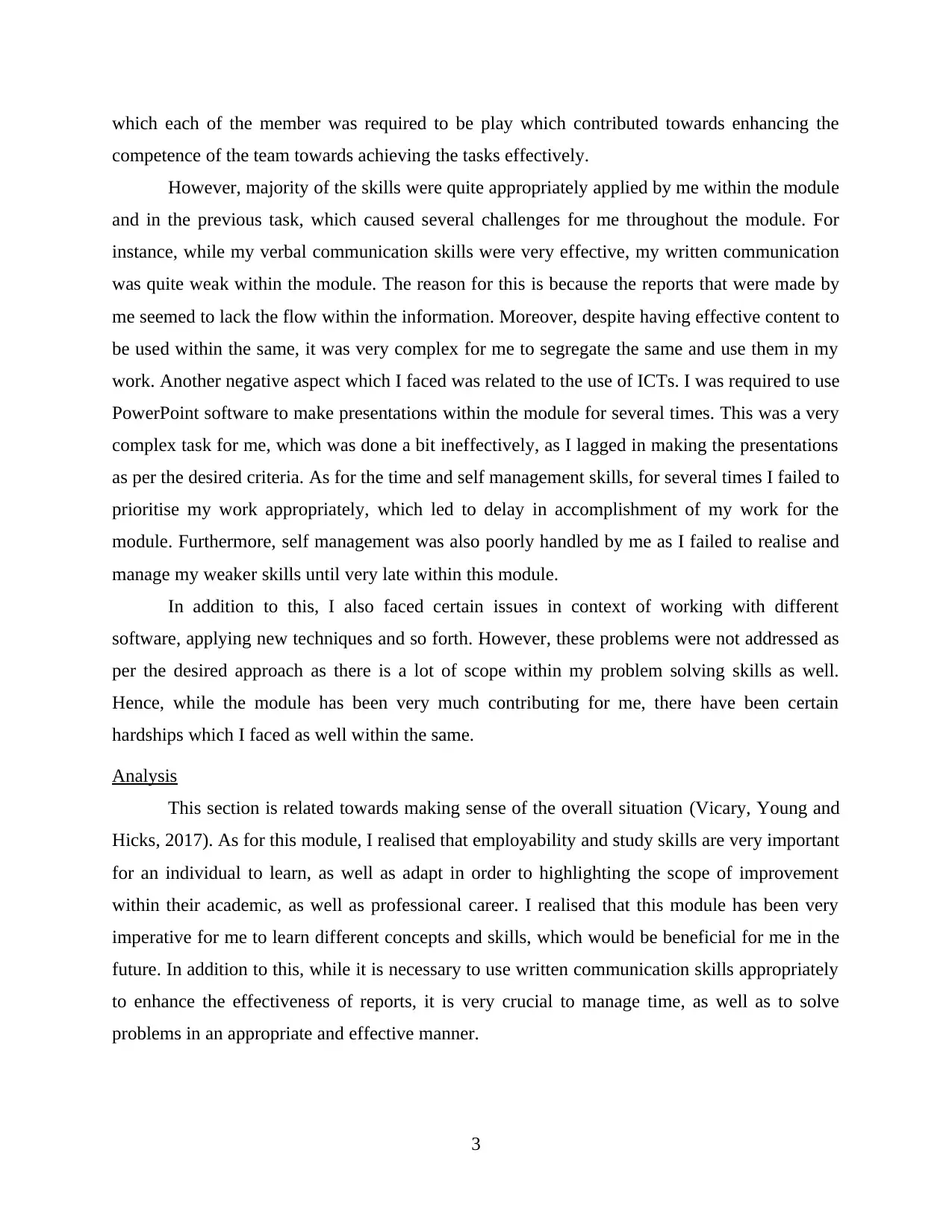
which each of the member was required to be play which contributed towards enhancing the
competence of the team towards achieving the tasks effectively.
However, majority of the skills were quite appropriately applied by me within the module
and in the previous task, which caused several challenges for me throughout the module. For
instance, while my verbal communication skills were very effective, my written communication
was quite weak within the module. The reason for this is because the reports that were made by
me seemed to lack the flow within the information. Moreover, despite having effective content to
be used within the same, it was very complex for me to segregate the same and use them in my
work. Another negative aspect which I faced was related to the use of ICTs. I was required to use
PowerPoint software to make presentations within the module for several times. This was a very
complex task for me, which was done a bit ineffectively, as I lagged in making the presentations
as per the desired criteria. As for the time and self management skills, for several times I failed to
prioritise my work appropriately, which led to delay in accomplishment of my work for the
module. Furthermore, self management was also poorly handled by me as I failed to realise and
manage my weaker skills until very late within this module.
In addition to this, I also faced certain issues in context of working with different
software, applying new techniques and so forth. However, these problems were not addressed as
per the desired approach as there is a lot of scope within my problem solving skills as well.
Hence, while the module has been very much contributing for me, there have been certain
hardships which I faced as well within the same.
Analysis
This section is related towards making sense of the overall situation (Vicary, Young and
Hicks, 2017). As for this module, I realised that employability and study skills are very important
for an individual to learn, as well as adapt in order to highlighting the scope of improvement
within their academic, as well as professional career. I realised that this module has been very
imperative for me to learn different concepts and skills, which would be beneficial for me in the
future. In addition to this, while it is necessary to use written communication skills appropriately
to enhance the effectiveness of reports, it is very crucial to manage time, as well as to solve
problems in an appropriate and effective manner.
3
competence of the team towards achieving the tasks effectively.
However, majority of the skills were quite appropriately applied by me within the module
and in the previous task, which caused several challenges for me throughout the module. For
instance, while my verbal communication skills were very effective, my written communication
was quite weak within the module. The reason for this is because the reports that were made by
me seemed to lack the flow within the information. Moreover, despite having effective content to
be used within the same, it was very complex for me to segregate the same and use them in my
work. Another negative aspect which I faced was related to the use of ICTs. I was required to use
PowerPoint software to make presentations within the module for several times. This was a very
complex task for me, which was done a bit ineffectively, as I lagged in making the presentations
as per the desired criteria. As for the time and self management skills, for several times I failed to
prioritise my work appropriately, which led to delay in accomplishment of my work for the
module. Furthermore, self management was also poorly handled by me as I failed to realise and
manage my weaker skills until very late within this module.
In addition to this, I also faced certain issues in context of working with different
software, applying new techniques and so forth. However, these problems were not addressed as
per the desired approach as there is a lot of scope within my problem solving skills as well.
Hence, while the module has been very much contributing for me, there have been certain
hardships which I faced as well within the same.
Analysis
This section is related towards making sense of the overall situation (Vicary, Young and
Hicks, 2017). As for this module, I realised that employability and study skills are very important
for an individual to learn, as well as adapt in order to highlighting the scope of improvement
within their academic, as well as professional career. I realised that this module has been very
imperative for me to learn different concepts and skills, which would be beneficial for me in the
future. In addition to this, while it is necessary to use written communication skills appropriately
to enhance the effectiveness of reports, it is very crucial to manage time, as well as to solve
problems in an appropriate and effective manner.
3
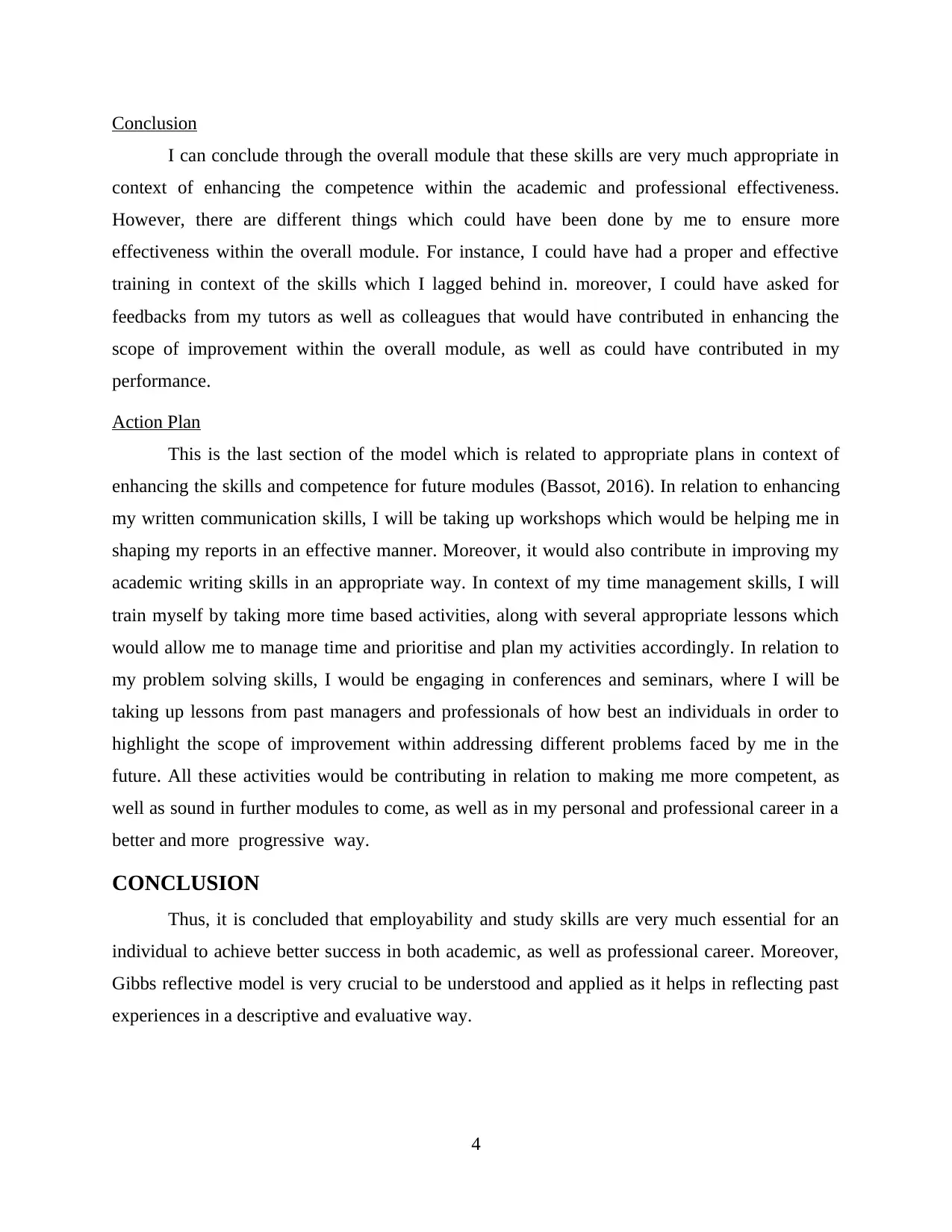
Conclusion
I can conclude through the overall module that these skills are very much appropriate in
context of enhancing the competence within the academic and professional effectiveness.
However, there are different things which could have been done by me to ensure more
effectiveness within the overall module. For instance, I could have had a proper and effective
training in context of the skills which I lagged behind in. moreover, I could have asked for
feedbacks from my tutors as well as colleagues that would have contributed in enhancing the
scope of improvement within the overall module, as well as could have contributed in my
performance.
Action Plan
This is the last section of the model which is related to appropriate plans in context of
enhancing the skills and competence for future modules (Bassot, 2016). In relation to enhancing
my written communication skills, I will be taking up workshops which would be helping me in
shaping my reports in an effective manner. Moreover, it would also contribute in improving my
academic writing skills in an appropriate way. In context of my time management skills, I will
train myself by taking more time based activities, along with several appropriate lessons which
would allow me to manage time and prioritise and plan my activities accordingly. In relation to
my problem solving skills, I would be engaging in conferences and seminars, where I will be
taking up lessons from past managers and professionals of how best an individuals in order to
highlight the scope of improvement within addressing different problems faced by me in the
future. All these activities would be contributing in relation to making me more competent, as
well as sound in further modules to come, as well as in my personal and professional career in a
better and more progressive way.
CONCLUSION
Thus, it is concluded that employability and study skills are very much essential for an
individual to achieve better success in both academic, as well as professional career. Moreover,
Gibbs reflective model is very crucial to be understood and applied as it helps in reflecting past
experiences in a descriptive and evaluative way.
4
I can conclude through the overall module that these skills are very much appropriate in
context of enhancing the competence within the academic and professional effectiveness.
However, there are different things which could have been done by me to ensure more
effectiveness within the overall module. For instance, I could have had a proper and effective
training in context of the skills which I lagged behind in. moreover, I could have asked for
feedbacks from my tutors as well as colleagues that would have contributed in enhancing the
scope of improvement within the overall module, as well as could have contributed in my
performance.
Action Plan
This is the last section of the model which is related to appropriate plans in context of
enhancing the skills and competence for future modules (Bassot, 2016). In relation to enhancing
my written communication skills, I will be taking up workshops which would be helping me in
shaping my reports in an effective manner. Moreover, it would also contribute in improving my
academic writing skills in an appropriate way. In context of my time management skills, I will
train myself by taking more time based activities, along with several appropriate lessons which
would allow me to manage time and prioritise and plan my activities accordingly. In relation to
my problem solving skills, I would be engaging in conferences and seminars, where I will be
taking up lessons from past managers and professionals of how best an individuals in order to
highlight the scope of improvement within addressing different problems faced by me in the
future. All these activities would be contributing in relation to making me more competent, as
well as sound in further modules to come, as well as in my personal and professional career in a
better and more progressive way.
CONCLUSION
Thus, it is concluded that employability and study skills are very much essential for an
individual to achieve better success in both academic, as well as professional career. Moreover,
Gibbs reflective model is very crucial to be understood and applied as it helps in reflecting past
experiences in a descriptive and evaluative way.
4
⊘ This is a preview!⊘
Do you want full access?
Subscribe today to unlock all pages.

Trusted by 1+ million students worldwide
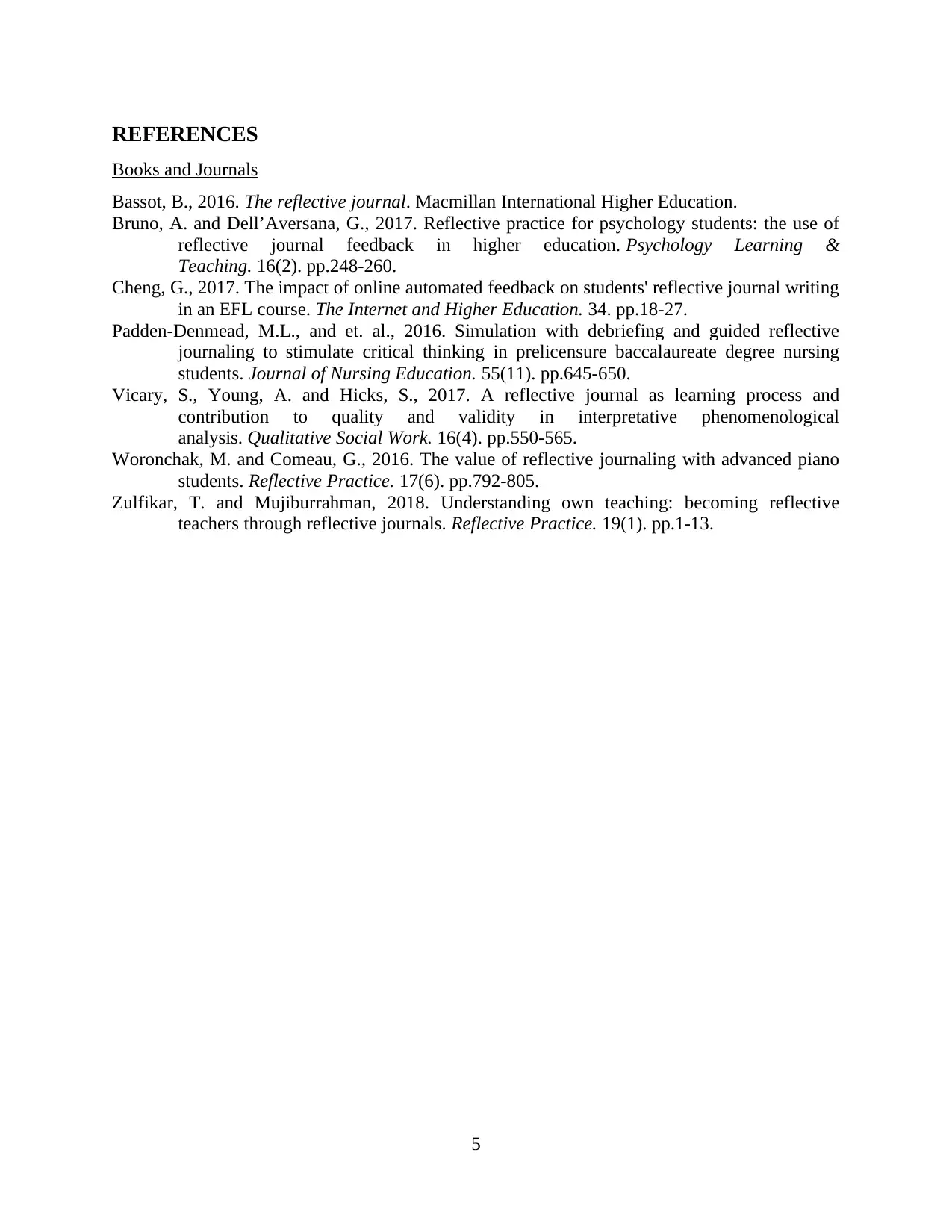
REFERENCES
Books and Journals
Bassot, B., 2016. The reflective journal. Macmillan International Higher Education.
Bruno, A. and Dell’Aversana, G., 2017. Reflective practice for psychology students: the use of
reflective journal feedback in higher education. Psychology Learning &
Teaching. 16(2). pp.248-260.
Cheng, G., 2017. The impact of online automated feedback on students' reflective journal writing
in an EFL course. The Internet and Higher Education. 34. pp.18-27.
Padden-Denmead, M.L., and et. al., 2016. Simulation with debriefing and guided reflective
journaling to stimulate critical thinking in prelicensure baccalaureate degree nursing
students. Journal of Nursing Education. 55(11). pp.645-650.
Vicary, S., Young, A. and Hicks, S., 2017. A reflective journal as learning process and
contribution to quality and validity in interpretative phenomenological
analysis. Qualitative Social Work. 16(4). pp.550-565.
Woronchak, M. and Comeau, G., 2016. The value of reflective journaling with advanced piano
students. Reflective Practice. 17(6). pp.792-805.
Zulfikar, T. and Mujiburrahman, 2018. Understanding own teaching: becoming reflective
teachers through reflective journals. Reflective Practice. 19(1). pp.1-13.
5
Books and Journals
Bassot, B., 2016. The reflective journal. Macmillan International Higher Education.
Bruno, A. and Dell’Aversana, G., 2017. Reflective practice for psychology students: the use of
reflective journal feedback in higher education. Psychology Learning &
Teaching. 16(2). pp.248-260.
Cheng, G., 2017. The impact of online automated feedback on students' reflective journal writing
in an EFL course. The Internet and Higher Education. 34. pp.18-27.
Padden-Denmead, M.L., and et. al., 2016. Simulation with debriefing and guided reflective
journaling to stimulate critical thinking in prelicensure baccalaureate degree nursing
students. Journal of Nursing Education. 55(11). pp.645-650.
Vicary, S., Young, A. and Hicks, S., 2017. A reflective journal as learning process and
contribution to quality and validity in interpretative phenomenological
analysis. Qualitative Social Work. 16(4). pp.550-565.
Woronchak, M. and Comeau, G., 2016. The value of reflective journaling with advanced piano
students. Reflective Practice. 17(6). pp.792-805.
Zulfikar, T. and Mujiburrahman, 2018. Understanding own teaching: becoming reflective
teachers through reflective journals. Reflective Practice. 19(1). pp.1-13.
5
1 out of 7
Related Documents
Your All-in-One AI-Powered Toolkit for Academic Success.
+13062052269
info@desklib.com
Available 24*7 on WhatsApp / Email
![[object Object]](/_next/static/media/star-bottom.7253800d.svg)
Unlock your academic potential
Copyright © 2020–2026 A2Z Services. All Rights Reserved. Developed and managed by ZUCOL.





